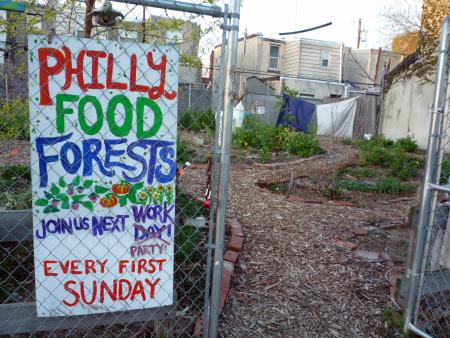Serendip is an independent site partnering with faculty at multiple colleges and universities around the world. Happy exploring!
Community Gardening


Before moving to West Philly about a year and a half ago, I had never planted, weeded, or harvested anything. It seems somewhat ironic that my move from a suburban campus with lots of fields perfect for gardening to an urban neighborhood with little green space would precipitate my interest in gardening. But, in actuality, my neighborhood is home to many small community gardens. Right near my house, for instance, is a community garden that works with the elementary school across the street, so kids can both have fun working in the garden and learn about different plants at the same time. My neighborhood is also home to some of the gardens affiliated with the “Philly Food Forests” movement, a group of rogue gardeners who find vacant lots around the city and transform them into gardens that provide fresh produce and herbs for surrounding communities.
I hope to become even more involved once I am less busy with homework and commuting to school, but what I have already been a part of is inspiring. One of the gardens is next to a halfway house for women getting out of state prison – some of whom volunteer their time in the garden, while others just harvest the food. Mercy Edible Park, in South Philly, stretches across empty lots that used to take up half the block. On a workday this past August, everyone from young children to eighty year-olds were helping out to get the garden ready for the fall. These gardens are not utopian: people fight over who gets to take what, and what will be planted where. But they do provide food for communities who often live in “food deserts,” with little access to supermarkets that sell fresh produce. Across the street from Mercy Edible Park is another “urban farm” run by a group of Bhutanese and Burmese refugee and immigrant families living in the neighborhood. They are not able to access many of the fruits and vegetables they are used to eating in local grocery stores, so instead they grow the food themselves.
As someone who sees food justice to be an immediate social justice concern, it is heartening to see solutions that are already in place in my own neighborhood. When I went to the PJSA annual conference this past fall in Boston, I attended two separate sessions looking at community gardening and its promise as a part of larger environmental justice efforts. What is important to recognize that people are both creating sustainable sources of fresh food, while at the same time listening to the needs and desires of local communities.



Comments
Post new comment